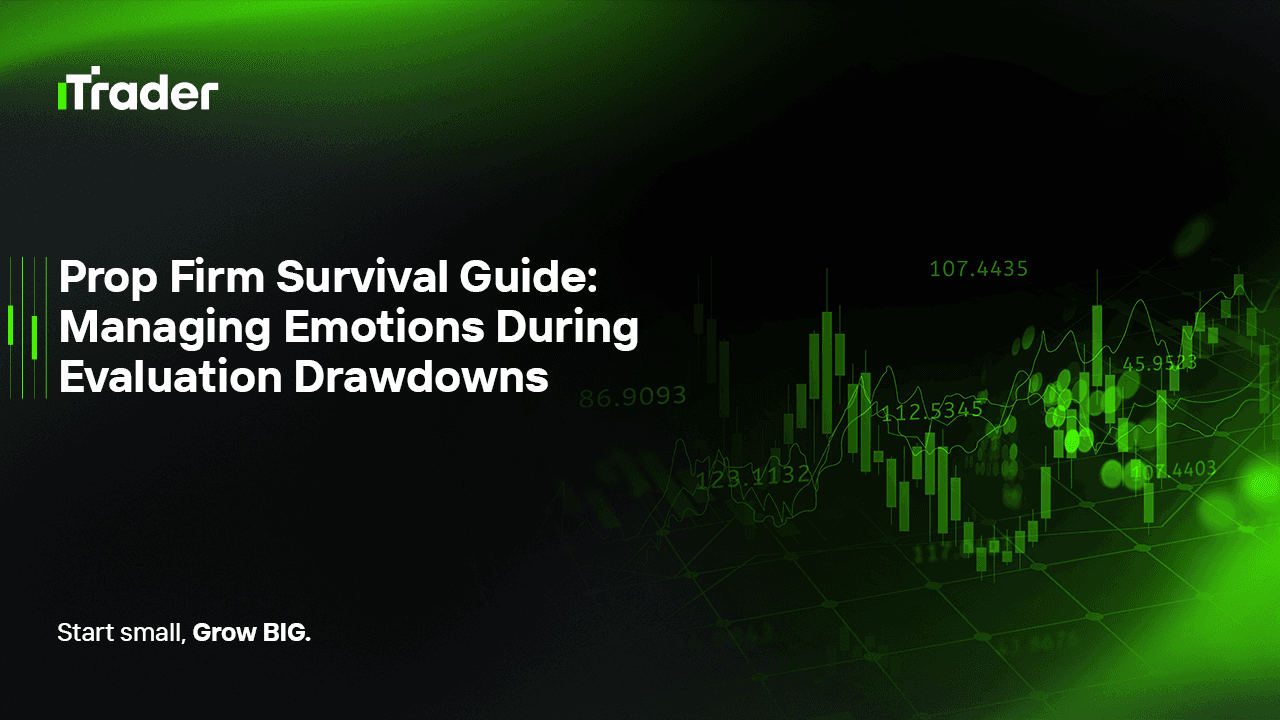2025-09-26
Prop firm challenges have become a gateway for aspiring traders to access larger trading capital. Passing such an evaluation means you can move beyond trading with your own limited funds and manage a professionally funded account. But behind this opportunity lies strict rules, unforgiving risk limits, and a true test of a trader’s discipline.

Most new traders prepare heavily on the technical side—indicators, strategies, backtests—yet they overlook the psychological challenge. The truth is that many traders fail not because of poor systems, but because they could not control their emotions when equity dropped. Drawdowns, in particular, are the most critical mental test.
This article explains what drawdowns are, why they matter in prop challenges, the emotional struggles they bring, and most importantly—how to manage them like a professional while staying beginner-friendly in approach.
A drawdown represents the decline in your account’s equity from its peak to the lowest point. For example:
Prop firms enforce strict limits such as:
Breaking either limit results in immediate disqualification, regardless of prior profits. That’s why drawdowns aren’t just numbers—they are the ultimate test of your risk management and discipline.
A drawdown is not just financial—it’s psychological. Traders under pressure often experience:
The thought of “I’m going to fail this challenge” leads to hesitation or closing trades too early.
Believing “The market is against me” can trigger impulsive decisions, breaking rules in search of quick revenge.
“I’m not good enough to be a trader” erodes confidence, leading to missed opportunities or giving up entirely.
The urge to win back losses quickly leads to oversized positions and risk-taking that only deepens the drawdown.
These emotions, if unmanaged, push traders into a downward spiral that usually ends with failing the challenge.
Have mechanical stop-points before emotions take over:
Such rules keep you from emotional overtrading.
Accept that drawdowns are part of the game, not proof of incompetence. Every system has natural fluctuations.
When emotions spike, step away. Deep breathing, a short walk, or even 10 minutes of detachment can reset your decision-making clarity.
Document how you feel during drawdowns. Over time, patterns emerge, giving you awareness of triggers that lead to mistakes.
Professional traders use meditation and visualization to mentally prepare for drawdowns, training the mind to stay calm under stress.
Experienced traders emphasize:
As one seasoned trader put it:
“You cannot control the market, but you can always control your response to it.”
Passing a prop firm challenge requires more than a profitable system. The real difference between those who succeed and those who fail lies in emotional control during drawdowns.
If you can:
you won’t just survive the challenge—you’ll build the foundation for a sustainable trading career.
In the end, the goal is not just to win trades, but to survive long enough to succeed.
© 2025 iTrader Global Limited | Số đăng ký công ty: 15962
iTrader Global Limited có trụ sở tại Hamchako, Mutsamudu, Đảo tự trị Anjouan, Liên bang Comoros và được cấp phép, quản lý bởi Ủy ban Chứng khoán Comoros. Giấy phép số: L15962/ITGL.
iTrader Global Limited hoạt động dưới tên thương mại “iTrader” và được cấp quyền thực hiện các hoạt động giao dịch ngoại hối. Logo, thương hiệu và trang web của công ty là tài sản độc quyền của iTrader Global Limited.
Các công ty con khác của iTrader Global Limited bao gồm: iTrader Global Pty Ltd, số đăng ký công ty tại Úc (ACN): 686 857 198. Công ty này là đại diện được ủy quyền (số đại diện AFS: 001315037) của Opheleo Holdings Pty Ltd (giấy phép dịch vụ tài chính Úc AFSL: 000224485), có địa chỉ đăng ký tại: Tầng 1, số 256 đường Rundle, Adelaide, SA 5000.
Tuyên bố miễn trừ trách nhiệm: Công ty này không phải là tổ chức phát hành và không chịu trách nhiệm đối với các sản phẩm tài chính được giao dịch trên hoặc thông qua trang web này.
Cảnh báo rủi ro: Giao dịch CFD có mức độ rủi ro cao do đòn bẩy và có thể dẫn đến mất vốn nhanh chóng, không phù hợp với tất cả người dùng.
Giao dịch quỹ, CFD và các sản phẩm có đòn bẩy cao khác đòi hỏi kiến thức chuyên môn.
Nghiên cứu cho thấy 84,01% nhà giao dịch sử dụng đòn bẩy bị thua lỗ. Hãy đảm bảo rằng bạn hiểu rõ rủi ro và sẵn sàng chấp nhận mất toàn bộ số vốn trước khi giao dịch.
iTrader tuyên bố rằng họ sẽ không chịu trách nhiệm đầy đủ đối với bất kỳ rủi ro, tổn thất hoặc thiệt hại nào phát sinh từ hoạt động giao dịch có đòn bẩy, dù là đối với cá nhân hay pháp nhân.
Hạn chế sử dụng: iTrader không cung cấp trang web hoặc dịch vụ cho cư dân tại các quốc gia nơi hoạt động này bị cấm bởi pháp luật, quy định hoặc chính sách.